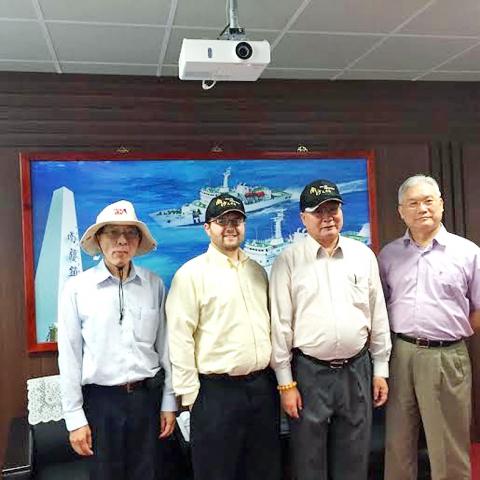The US hopes Taiwan’s new government can make available relevant historical data on the South China Sea and shed light on the status of the Republic of China’s (ROC) “U-shaped line” in the region in the face of international law, National Taiwan Ocean University’s Institute of the Law of the Sea director Robert Chen (陳荔彤) said on Thursday.
The “U-shaped line” refers to the ROC’s formal claim of sovereign territory in the South China Sea post-World War II, in accordance with agreements made in the Cairo Declaration of Nov. 27, 1943, and the Potsdam Declaration of July 26, 1945.
Chen was in Washington last week for an annual meeting of the American Society of International Law.

Photo: Tsao Yu-fen, Taipei Times
According to Chen, US officials said Washington felt President Ma Ying-jeou’s (馬英九) administration did not react strongly enough to China’s large-scale land reclamation projects in the South China Sea, adding that the US felt the Ma administration had not showed great support toward the US sending ships and planes into the region to bolster freedom of navigation and flight.
While the Ma administration’s explanation of the “U-shaped line” is correct, the most important part is the claims based on “historic rights,” Chen said.
Under the UN Convention on the Law of the Sea (UNCLOS), territorial water can only be claimed if it is connected to a nation’s sovereign territory, Chen said, adding that the “U-shaped line” contravened this.
However, Chen also said that the UNCLOS came into effect in 1980, while the ROC had already claimed islands — most notably Itu Aba Island (Taiping Island, 太平島) — in the South China Sea in 1947, adding that despite the ROC government retreating to Taiwan in 1949, the nation’s claim was staked in 1947 and should not be given up lightly.
The incoming government should continue to adhere to such ambiguous claims, Chen said, adding that an “actual takeover” of the islands in the South China Sea had been researched, announced and implemented without dispute at the time.
Chen said he told US officials that Taiwan’s claims had strategic ambiguity and he hoped the US would support such a move, adding that Taiwan would not seek to cooperate with China in the South China Sea, nor would it enter into conflict against China over the issue.

The CIA has a message for Chinese government officials worried about their place in Chinese President Xi Jinping’s (習近平) government: Come work with us. The agency released two Mandarin-language videos on social media on Thursday inviting disgruntled officials to contact the CIA. The recruitment videos posted on YouTube and X racked up more than 5 million views combined in their first day. The outreach comes as CIA Director John Ratcliffe has vowed to boost the agency’s use of intelligence from human sources and its focus on China, which has recently targeted US officials with its own espionage operations. The videos are “aimed at

STEADFAST FRIEND: The bills encourage increased Taiwan-US engagement and address China’s distortion of UN Resolution 2758 to isolate Taiwan internationally The Presidential Office yesterday thanked the US House of Representatives for unanimously passing two Taiwan-related bills highlighting its solid support for Taiwan’s democracy and global participation, and for deepening bilateral relations. One of the bills, the Taiwan Assurance Implementation Act, requires the US Department of State to periodically review its guidelines for engagement with Taiwan, and report to the US Congress on the guidelines and plans to lift self-imposed limitations on US-Taiwan engagement. The other bill is the Taiwan International Solidarity Act, which clarifies that UN Resolution 2758 does not address the issue of the representation of Taiwan or its people in

US Indo-Pacific Commander Admiral Samuel Paparo on Friday expressed concern over the rate at which China is diversifying its military exercises, the Financial Times (FT) reported on Saturday. “The rates of change on the depth and breadth of their exercises is the one non-linear effect that I’ve seen in the last year that wakes me up at night or keeps me up at night,” Paparo was quoted by FT as saying while attending the annual Sedona Forum at the McCain Institute in Arizona. Paparo also expressed concern over the speed with which China was expanding its military. While the US

SHIFT: Taiwan’s better-than-expected first-quarter GDP and signs of weakness in the US have driven global capital back to emerging markets, the central bank head said The central bank yesterday blamed market speculation for the steep rise in the local currency, and urged exporters and financial institutions to stay calm and stop panic sell-offs to avoid hurting their own profitability. The nation’s top monetary policymaker said that it would step in, if necessary, to maintain order and stability in the foreign exchange market. The remarks came as the NT dollar yesterday closed up NT$0.919 to NT$30.145 against the US dollar in Taipei trading, after rising as high as NT$29.59 in intraday trading. The local currency has surged 5.85 percent against the greenback over the past two sessions, central